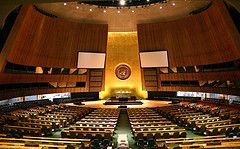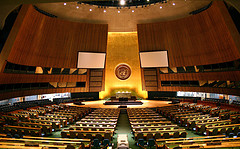COP17 ‘likely to fail’ on legally-binding, post-2012 climate deal
COP17 is unlikely to deliver a global agreement on binding emissions. However, experts suggest that the UN and the private sector will still play an essential role once the Kyoto Protocol runs out next year. They urge the private sector to innovate, voluntarily reduce its CO2 emissions and get used to a world without subsidies.

 “A global agreement on binding emissions reductions is unlikely, but progress against climate change can still be made through a patchwork of initiatives and commitments by forward-thinking countries, sub-national governments, international organisations, businesses, and civil society.”
“A global agreement on binding emissions reductions is unlikely, but progress against climate change can still be made through a patchwork of initiatives and commitments by forward-thinking countries, sub-national governments, international organisations, businesses, and civil society.”
This conclusion comes from a group of experts from China, Germany and the US working as part of the Global Governance 2020 programme. Their report was presented at the London School of Economics last night and included a range of recommendations about how businesses could take the lead in creating a sustainable, greener future.
The report says that businesses must “be prepared to take the lead” and argues that “businesses should seize public relations and first-mover advantages by voluntarily reducing emissions”.
It also advocates cross-sector collaboration as a way to “help reduce the costs and complexity of compliance with different regulation and policies”.
Thomas Hale of Princeton University, one of the co-authors of the paper, suggested “there are great opportunities for the private sector to make a difference in certain key industries”.
“For example, international shipping accounts for around 2% of global CO2 emissions, yet it is dominated by just a handful of companies. This means that this sector could potentially make a real reduction in CO2 emissions without us actually having to get a lot of people on board,” he added.
Despite this emphasis on the private sector and local-level collaborations, Lord Giddens, who was also speaking at the event last night, was keen to stress the role that the UN has to play in mitigating climate change. “We need the UN” he said. “There is a massive gap between the track we’re on now and the track we need to be on if we’re going to limit climate change. This gap is extremely disturbing”.
In addition, the report emphasises the importance of businesses “shifting their attention toward developing profitable products and services in the absence of subsidies”.
Hale said: “At the moment subsidies are necessary, but over the longer term businesses need to become competitive without them…we can see this already starting to happen in a number of sectors”.
Finally, the report highlights the importance of governments providing a stable investment environment for businesses. However, the authors feel that the likelihood of this is small, stating: “Businesses should prepare for inconsistency in climate policy by taking voluntary actions that emphasise collaboration across industrial sectors, governments at all levels, and civil society actors.”
Image: Gruban | Flickr



